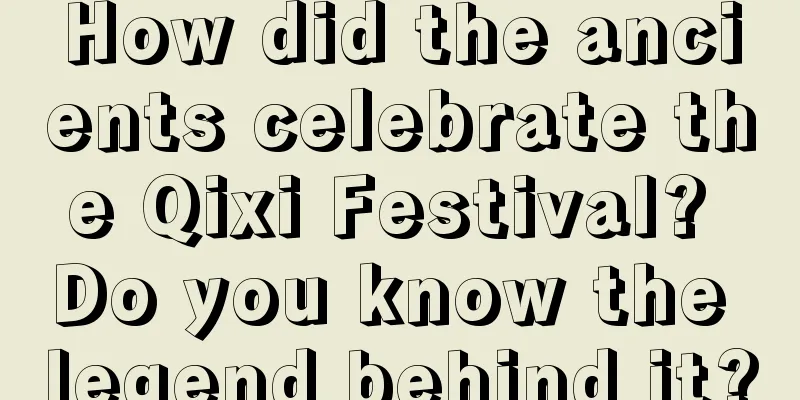How did the ancients celebrate the Qixi Festival? Do you know the legend behind it?

August 25, 2020, the seventh day of the seventh month of the lunar calendar, is the annual Chinese Valentine's Day. It is the day when "the night sky is as cool as water, and one lies down to watch the Altair and Vega stars." Chinese people seem to have a special ability to turn all festivals into Valentine's Day and shopping festivals, into a shopping spree and affection-showing competition, plus Weibo and Moments... In fact, when it comes to celebrating festivals, modern people's imagination is really poor, far inferior to that of the ancients thousands of years ago. Let’s take a look at how the ancients celebrated the Qixi Festival. The seventh month of the lunar calendar is a month filled with the fragrance of fruits and flowers. What are the good days in the seventh month of the lunar calendar in 2020? Come to Mr. Shui Mo's website to learn relevant knowledge.1. Qixi FestivalQixi Festival, originally known as the Qiqiao Festival.The Qixi Festival, a festival for praying for good skills, originated in the Han Dynasty. In the Miscellaneous Records of the Four Capitals written by Ge Hong of the Eastern Jin Dynasty, there is a record that "beautiful women of the Han Dynasty used to thread seven-hole needles in the Kaijin Tower on July 7th, and everyone was accustomed to it." This is the earliest record of praying for good skills that we have seen in ancient documents. As time passed, the legend of the Cowherd and the Weaver Girl meeting on the Magpie Bridge gradually became part of the Chinese Valentine's Day festival. In ancient mythology, the Weaver Girl is a skilled woman from the fairyland who can weave exquisite brocades and is a role model that all women in the world aspire to be. Therefore, women in later generations would beg the Weaver Girl for wisdom and skills on the night of the Qixi Festival. This is the original appearance of the Chinese Valentine's Day. Therefore, the Chinese Valentine's Day is also called the Qiqiao Festival, and a variety of Qiqiao customs have emerged. The moon in Chang'an city is as bright as a silk thread, and every family is holding needle and thread tonight. The fairy skirt and jade pendant are in vain, as we can never meet in heaven or on earth. The poem "Qixi" by Tang Dynasty poet Cui Hao recreates the grand scene of the Qixi night in the capital Chang'an. The most common form of praying for wisdom on the Qixi Festival is threading a needle. Wang Renyu of the Five Dynasties said in "Kaiyuan Tianbao Yishi": "On the seventh night of the seventh month, the palace built a palace with brocade, a hundred feet high, which could hold dozens of people. Fruits, wine and roasted vegetables were laid out, and seats were set up to worship the two stars of the Cow and the Girl. The concubines each used a nine-hole needle and five-colored thread to thread a string towards the moon. The one who passed through would be considered a wise prince. The music of Qingshang was played and the feast lasted until dawn. All the local people followed suit. ” In addition to threading the needle to pray for dexterity, the game of "throwing the needle" was also popular during the Ming and Qing dynasties. In the Ming Dynasty, Chen Bang once described in detail the playing method of "Throwing the Clever Needle" in "Wan Shu Miscellaneous Notes": "The women of Yandu would expose a bowl of water to the sun for seven days, then throw a small needle into the water and float it on the surface. They would then slowly observe the shadow of the sun on the bottom of the water. Some would be scattered like flowers, some would be moving like clouds, some would be thin like a thread, and some would be thick like a mallet. This was used to predict the woman's skill." 2. Qixi Book Showing FestivalQixi Festival is certainly not just a carnival for women. There are also records saying that "Qixi" originated from people's worship of nature.According to historical documents, records of Altair and Vega appeared at least three or four thousand years ago, with the emergence of astronomical knowledge and textile technology. People believed that there were seven groups of stars representing directions in the east, west, south and north, collectively known as the Twenty-Eight Mansions. Among them, the Big Dipper was the brightest and could be used to identify directions at night. The first star of the Big Dipper is called Kuixing, also known as Kuishou. Later, with the establishment of the imperial examination system, the top scorer in the imperial examination was called "the best scholar in the world". Scholars called the Qixi Festival the "Kui Xing Festival", also known as the "Book Drying Festival", which retained traces of the Qixi Festival's earliest origin from star worship. On the seventh day of the seventh month of the lunar calendar, scholars who wish to achieve academic success would routinely worship Kuixing, praying for good luck in the exam. Some scholars will also display their books on this day to show off their talents. There is a story about the ancients drying books. One day, after Su Dongpo finished his meal, he lay in the yard with his belly exposed. He looked around at the maids around him and asked, "What's in my stomach?" One of them said it was an article, but Dongpo disagreed. Another woman said it was wisdom and insight, but Su Dongpo thought it was not appropriate. At this time, Wang Zhaoyun, who was regarded as a kindred spirit by Su Dongpo, said: "What the scholar has said is inappropriate." Liu Yiqing recorded a story about drying books in Shishuo Xinyu: On July 7th, everyone was drying their books, except Hao Long, who ran to lie under the sun. When people asked him why, he replied, "I'm drying my books." Showing off one's belly means showing off one's books. Just a few dozen words can express Hao Long's scholarly spirit. The custom of drying scriptures on July 7 to protect them from insects was first recorded in Monthly Ordinances for the Four Classes of People by Cui Shi of the Han Dynasty. Tao Zongyi of the Ming Dynasty wrote a poem called "Qixi Ci Wanshan Yun": "I occasionally forget today when I am drying my books, and I am glad to meet this evening when I am begging for skills." Emperor Qianlong of the Qing Dynasty wrote in a poem: "On the seventh day of the new year, ... it is a good time to expose books to the sun." It can be seen that drying books on the Qixi Festival is a very popular folk custom. 3. Chinese Valentine's DayThe relationship between Qixi Festival and love occurred in the Tang Dynasty.After the great poet Bai Juyi wrote "Song of Everlasting Sorrow", it quickly spread across the country. "On the seventh day of the seventh month in the Changsheng Palace, when no one is whispering in the middle of the night. I wish to be a pair of wings in the sky, and a pair of branches on the ground." It became the hot word of the year. From then on, young girls and young women would dress up in their best clothes on the night of the Chinese Valentine's Day and light candles and burn incense under the moon. In addition to praying to the Weaver Girl for dexterity, people also hope to meet their true love or wish for a happy marriage. It was not until the Song Dynasty that the great poet Qin Guan's poem "Magpie Bridge" completely tied love and the Chinese Valentine's Day together. The thin clouds are playing tricks, the flying stars are conveying hatred, and the Milky Way is moving in the dark. When the golden wind and jade dew meet, it is better than countless things in the world. Tenderness is like water, the good time is like a dream, I can’t help but look back at the Magpie Bridge on the way home. If the love between two people lasts for a long time, why does it matter if they are together day and night? Today, modern people only know about the "Chinese Valentine's Day" and don't know what the Qiqiao Festival and the worship of Kuixing are. The essence of many traditional cultures, like the customs of the Qixi Festival, have gradually been submerged in the long river of history. I believe that after reading this article, you will have a better understanding of the Qixi Festival. I hope we can all learn about Chinese traditional culture, our own customs and habits, and live with more ritual no matter what festival it is. |
<<: When is Chinese Valentine’s Day in 2020? What festival comes after Qixi Festival?
Recommend
How about the 19th day of the eighth lunar month in 2018? Is it a good time to get a haircut?
Introduction: In Chinese tradition, sometimes you ...
Do people born in the hour of Shen during the Frost Descent solar term in 2019 have good fortune?
Do people born in the hour of Shen during the Fros...
Analysis of the second day of the eleventh lunar month in 2021, is it a good day to sign a contract?
Speaking of signing contracts, I believe everyone ...
What is the auspicious time for the beginning of autumn in 2021? How to judge the auspiciousness or inauspiciousness of the time?
When the cool breeze arrives, white dew appears. T...
What are the taboos and things that cannot be done on the 20th day of the eighth lunar month in 2018?
It is the eighth month of the lunar calendar, the...
Is it good for people born in the Grain Rain solar term of the Dragon to have a good fate? Is it good or bad to be born in the Grain Rain solar term?
Introduction: Grain Rain is one of the 24 solar te...
Is it possible to move house on the first day of the fourth lunar month in 2017?
Introduction: If you don’t choose an auspicious da...
Analysis of the 28th day of the second lunar month in 2022. Is that day an auspicious day?
Some lunar calendar days are good, while some are ...
Is the fourth day of the third lunar month in 2018 a good day? Is it a suitable day for starting renovations?
With the continuous development of society, people...
Comparison table of the Gregorian calendar for the leap April in 2020. When will the next leap April be in 2020?
Introduction: Leap April does not occur every year...
Can we worship our ancestors on the Beginning of Winter in 2017? What is the origin of Beginning of Winter?
Introduction: The arrival of Lidong means the begi...
Is it good for a child born on the 19th day of the sixth lunar month to have a good fate? Be outstanding and gain both fame and fortune?
Introduction: Every child is born on a lunar day, ...
Can we open the business on October 14th of the lunar calendar in 2021? Is it good to open the business?
It is also necessary to choose a good time to open...
Can we pray on the 16th day of October in the lunar calendar in 2021?
There are certain rules and regulations for the ti...
Is the fate of a boy born on the eighth day of the tenth lunar month in 2020, the day of Xiaoxue, good or bad?
The arrival of the Minor Snow solar term indicates...









